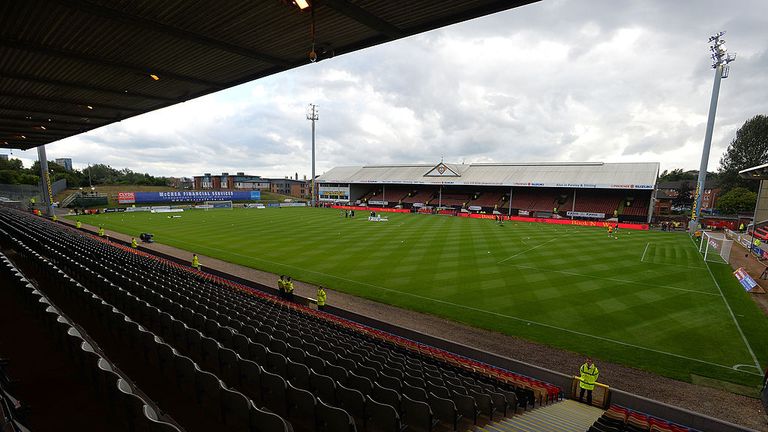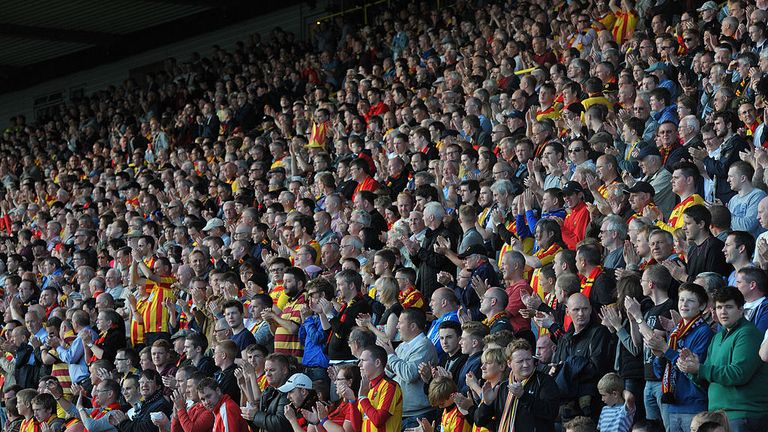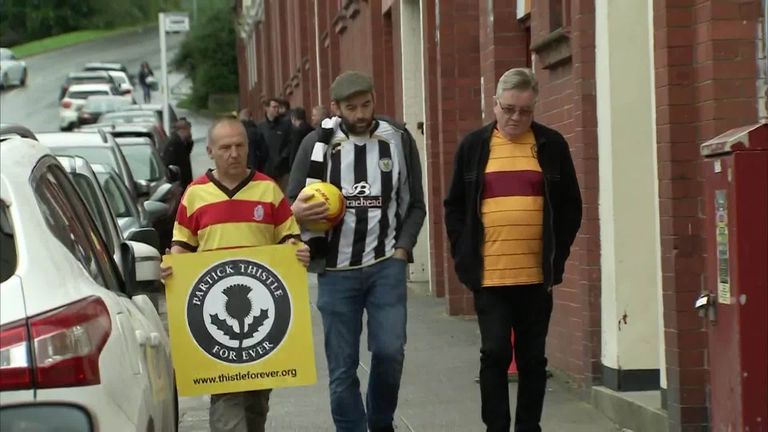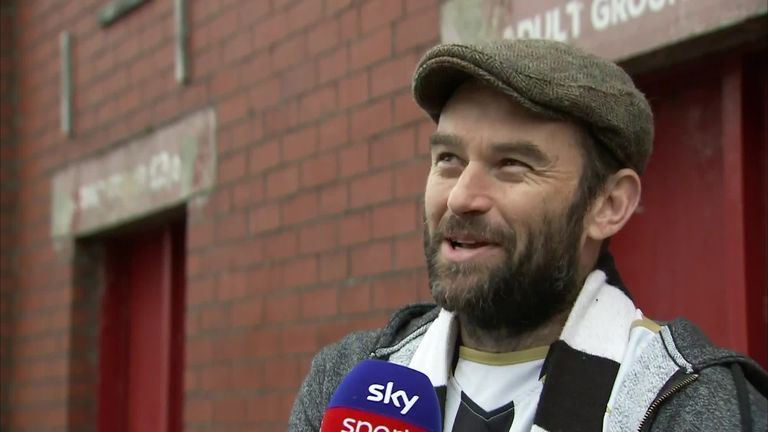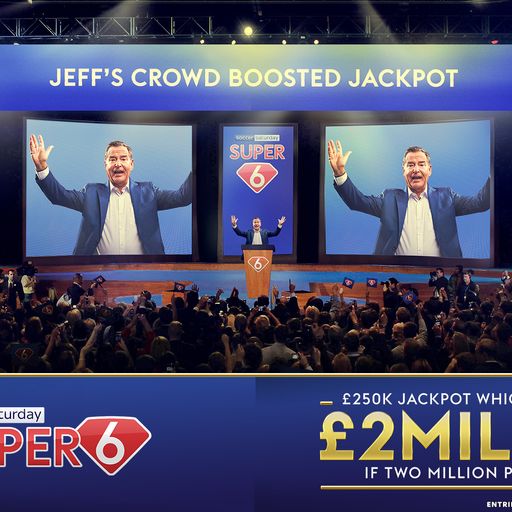Scottish clubs' fan ownership: A model for more EFL sides to follow?
Wednesday 4 September 2019 06:15, UK
As the ownership troubles involving Bury and Bolton continue, Sky Sports News examines the fan-owned models adopted by some Scottish clubs.
Bury were expelled from Sky Bet League One last week with the EFL after C&N Sporting Risk pulled out of a proposed takeover of the club.
With the EFL now prepared to discuss their readmission to the Football League, Gary Neville, who has close links with Bury, recently urged Shakers fans to take control and secure the future of their club.
Bury's two MPs, Manchester Mayor Andy Burnham and supporters society Forever Bury are also part of a working group looking to secure the club's status in League Two next season.
Meanwhile, Bolton were also on the verge of liquidation last week before Football Ventures' takeover was confirmed.
The club had 14 days to secure their long-term future or risk expulsion from the EFL.
Fan ownership in Scotland: A desirable model?
In 2016, Motherwell became a fan-owned Scottish Premiership side with the Well Society supporters group acquiring a 76 per cent shareholding in the club.
St Mirren were taken over earlier that same year, following a joint bid from their former director Gordon Scott and the St Mirren Independent Supporters Association.
They are only two examples of fan ownership and influence at Scottish football clubs, Stirling Albion were the first British club to achieve 100 per cent fan ownership in 2010 when the Stirling Albion Supporters Trust took over.
Clyde and East Stirlingshire have similar structures, while Dunfermline Athletic were saved from administration and potential oblivion in 2013 by the Pars Trust. Annan Athletic voted to become fully fan-owned in 2017.
The concept has also been embraced by two Scottish footballing giants, albeit in different contexts.
Heart of Midlothian were rescued from administration in 2014 by local businesswoman Ann Budge.
Next year Budge is due to hand her shareholding over to the supporters' group Foundation of Hearts, which will make Hearts the largest fan-owned football club in the UK.
Budge will stay on for at least a year to ensure a smooth transition, from which point Hearts supporters will call all the shots.
Across Edinburgh, Hibernian announced plans in 2015 to give their fans the opportunity to own at least 51 per cent of club shares, but the landscape has changed at Easter Road in recent times.
Majority shareholder Tom Farmer was bought out by US businessman Ron Gordon during the summer, but around a third of shares in Hibernian are currently owned by supporters.
This week, a new Partick Thistle supporters group have launched their campaign to take control of the Scottish Championship club, amid concerns over a possible takeover.
Thistle For Ever say they aim to secure a majority shareholding for fans of the Firhill side due to speculation around a possible sale to a consortium "with no links to the club or its community".
Supporters groups already own nearly 27 per cent of the club's shares, and this campaign is looking to add a further 24 per cent, by making an offer to all existing shareholders to sell to the fans.
The move comes after EuroMillions lottery winner Colin Weir withdrew his financial support for the club and academy last month following boardroom changes, while speculation is rife that the owners of Barnsley are negotiating to buy Thistle.
Sky Sports News spoke to members of Partick Thistle, Motherwell and St Mirren's supporters groups, to compare and contrast their own thoughts on fan-based ownership.
Paul Goodwin, Thistle For Ever
It's the heart and soul of why you're involved in football; all you want is the best for your own club.
I think we're concerned (about Patrick Thistle's future). Two months ago, we were told about a deal coming to the table that was transformational for the club, but no details have emerged.
We've gone from a situation where we had a benevolent benefactor contributing a lot to the club (lottery winner Chris Weir, who has since walked away), and no debt, to now a place of uncertainty.
We own nearly 30 per cent of the club already. If this group of directors are genuine Partick Thistle shareholders, we now offer an option to them that could take the club in a different direction, that could have it vested within the community.
We are debt-free. We should be playing within our means.
I think fan ownership is a model that can work; we've seen it right up to clubs the size of Hearts, it works. I really think it can be embraced, but you have really got to look at who is in charge.
Our hearts go out to them at Bolton and Bury. It's got to come from the fans, they need to galvanise themselves and get the community together; it happened in England in the past at Exeter City and Wimbledon which were incredibly difficult situations.
The knowledge and experience is there now to do it that wasn't ten to fifteen years ago.
Pat McCaughey, Well Society
What worked (at Motherwell) was having control. The key to everything at football clubs is control. We had good help from Les Hutchison in securing the club, and then the situation was we had to pay Les back, and that worked.
The Motherwell academy has done astonishingly well, it's a great blueprint for Scottish football in general. You just have to look at the products there that have brought income into the club.
This season, we've assembled a fairly strong squad that we haven't been able to do before. A lot of the young lads have come in and really stepped up to it and done well.
Within all of that, Motherwell is a community club; we have 2700 members in the Well Society. I got my newsletter in the other day, telling me how much I've put into the club, asking for ideas and contributions... you're part of it.
I think that's what fans really want, they don't want to be on the outside being worried if someone is going to come in with big bucks to save their club, like at Bury or Bolton.
The first hurdle is belief. Paul Goodwin and I were at a Motherwell game and we were in hospitality, talking to people there, who were regular Motherwell supporters.
They were people who financially could afford to contribute to the Well Society and the club, but when we talked to them they said, "Oh, that's all a bit pie in the sky."
They didn't really believe that the fans could grow in influence and ownership and buy shares up in the club. Even if it's only inching forward, percentage by percentage, you might not own the whole club, but you've got a say in the club. I think that's important.
Getting people to believe that is possible, and getting people to believe they can change things, it's a big hurdle. It surprised me how people were shuffling their feet and wouldn't do anything.
Gordon McAllister - St Mirren Society
We had an owner (former chairman Stewart Gilmour) who had wanted to sell up for a long time, and there was no real prospect of anybody coming along - no shining knight in armour!
The fans put their money together and found someone who would take that responsibility (current chairman Gordon Scott) and then pay that money back.
There was still that uncertainty there, you didn't know who was going to come along and try to buy the club. We've seen plenty of people come along, buy clubs and desert them again after years or months in charge.
Having that ownership gives you that sort of certainty rather than anything else.
Fan ownership in itself is relatively new. Maybe some people think they will have more control because of their investment.
Just that feeling that this is no longer a business, it's a community and it belongs to you now, that's the thing that's definitely worked.
These smaller clubs, the ones that aren't businesses, don't really have much more of an option. These are community clubs; Bury was never going to be in Europe.
St Mirren are not ever going to be in Europe, we have those dreams… but they are about the fans and that community. Nobody will make money out of these clubs.
It seems almost common sense that because those clubs are for the community and by the community, why aren't they owned by the community?
